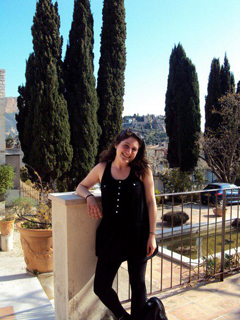Maybe I Should Go Back to Hebrew School
Permanent link All Posts
What a month it has been.
It’s been a month, hasn’t it? The days simultaneously fly by and crawl past when forced to sit out on the sidelines. Last month I wrote about breaking my ankle. Today, I get my cast off. It seems like a rite of passage I never really wanted to go through, but I’m feeling jittery and excited the night before I am scheduled to remove my recently acquired leg accessory.
One of the myriad activities keeping me busy this month is an edit of my friend’s grad school thesis. When Ingrid emailed from Munich that she was looking for an American set of eyes to peer over any language mishaps in her entirely-in-English analysis, I was happy to oblige. Yes, German is her first language. She speaks about seven others. And that entirely-in-English essay? Very nearly flawless. Her mastery speaks to something I often think about ... oh how I wish to be a polyglot. I wish I could add another language to my shortlist, currently existing of English and French.
Sure, I speak French to a fairly decent degree. At one point, I would say I was functionally fluent. I’m a bit out of practice now, though I try my best to dust up by reading French blogs and books, listening to foreign pop tunes and watching French news from time to time. I love speaking, reading, writing French with entirely reckless abandon, even when my language skills are in a sad state of disrepair. On the flip side of the coin, I often wonder – what if I had kept going and added Hebrew to the mix? What a polyglot I’d be then.
I have a bit of a history with Hebrew. My father speaks a little bit; his side of the family hails from Israel. I often wore this tidbit of my life as a badge of honor when my middle-school self would strut to advanced Hebrew class in sixth grade (oy vey). And by “advanced Hebrew class,” I mean it was taught by a strikingly skinny 16-year-old Israeli boy in a room on Sunday mornings. It was my first real taste of foreign language learning and I always looked forward to when we would flip open our workbooks and try something new. I kept up with it until my bat mitzvah, and sadly, that was the end of my interaction with the Hebrew for a while.
My first job out of college, I worked for an Israeli boss. Each day, she communicated in Hebrew on the phone for business, and it left quite the impression. Call me crazy, I love the speed of the language. It feels as if the speaker is always running a race. I enjoy the urgency of it all. I always delighted in picking up little phrases from my boss and coworkers and peppering them into my every day. It’s a feisty language. The story of how it was brought back as a secular language is fascinating. At the same time, I know so little, both about the language and its background, and I would love to learn more.So maybe I’ll try to learn Hebrew again. I should head back to Hebrew school, start from the beginning. Honestly, I think it would be interesting to try. Learning language at this stage in the game is enormously tough, but that’s what Rosetta Stone is for. If I ever give another language a go, I look forward to the new expressions, the new way words form on my tongue; the way that a new language reshapes my personality when I speak it. A new language forms a new perspective. And to have eight of those under your belt? Now, polyglots of the world, that’s just simply not fair.



.jpg)



